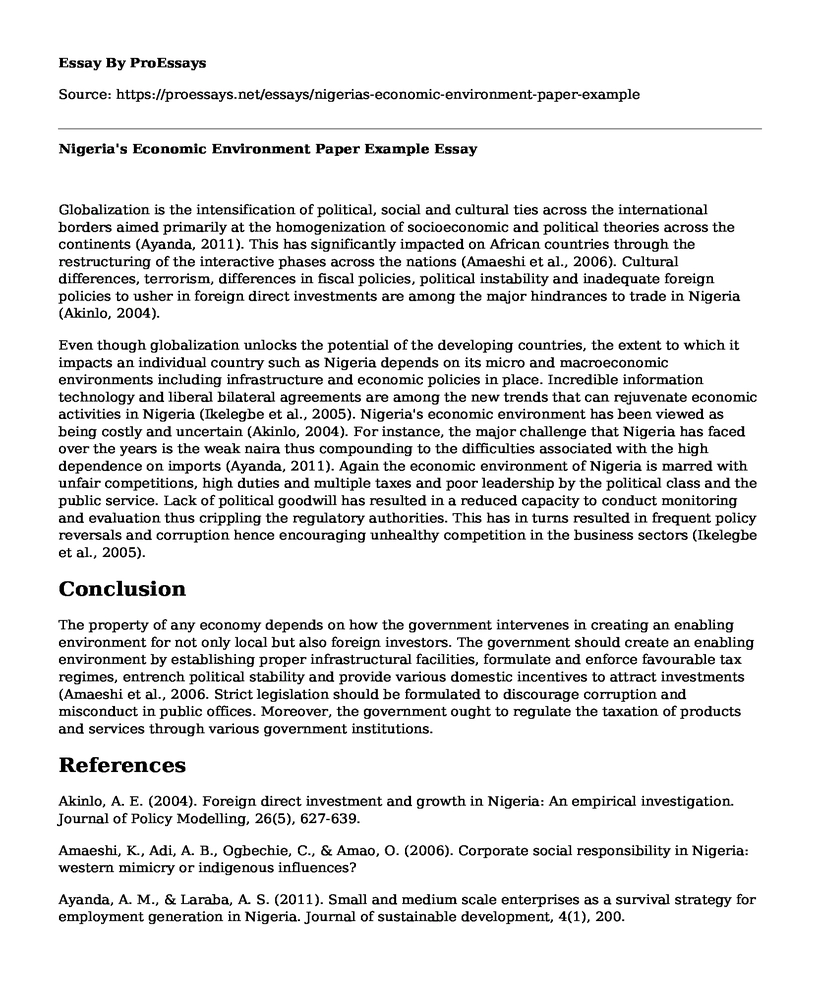Globalization is the intensification of political, social and cultural ties across the international borders aimed primarily at the homogenization of socioeconomic and political theories across the continents (Ayanda, 2011). This has significantly impacted on African countries through the restructuring of the interactive phases across the nations (Amaeshi et al., 2006). Cultural differences, terrorism, differences in fiscal policies, political instability and inadequate foreign policies to usher in foreign direct investments are among the major hindrances to trade in Nigeria (Akinlo, 2004).
Even though globalization unlocks the potential of the developing countries, the extent to which it impacts an individual country such as Nigeria depends on its micro and macroeconomic environments including infrastructure and economic policies in place. Incredible information technology and liberal bilateral agreements are among the new trends that can rejuvenate economic activities in Nigeria (Ikelegbe et al., 2005). Nigeria's economic environment has been viewed as being costly and uncertain (Akinlo, 2004). For instance, the major challenge that Nigeria has faced over the years is the weak naira thus compounding to the difficulties associated with the high dependence on imports (Ayanda, 2011). Again the economic environment of Nigeria is marred with unfair competitions, high duties and multiple taxes and poor leadership by the political class and the public service. Lack of political goodwill has resulted in a reduced capacity to conduct monitoring and evaluation thus crippling the regulatory authorities. This has in turns resulted in frequent policy reversals and corruption hence encouraging unhealthy competition in the business sectors (Ikelegbe et al., 2005).
Conclusion
The property of any economy depends on how the government intervenes in creating an enabling environment for not only local but also foreign investors. The government should create an enabling environment by establishing proper infrastructural facilities, formulate and enforce favourable tax regimes, entrench political stability and provide various domestic incentives to attract investments (Amaeshi et al., 2006. Strict legislation should be formulated to discourage corruption and misconduct in public offices. Moreover, the government ought to regulate the taxation of products and services through various government institutions.
References
Akinlo, A. E. (2004). Foreign direct investment and growth in Nigeria: An empirical investigation. Journal of Policy Modelling, 26(5), 627-639.
Amaeshi, K., Adi, A. B., Ogbechie, C., & Amao, O. (2006). Corporate social responsibility in Nigeria: western mimicry or indigenous influences?
Ayanda, A. M., & Laraba, A. S. (2011). Small and medium scale enterprises as a survival strategy for employment generation in Nigeria. Journal of sustainable development, 4(1), 200.
Ikelegbe, A. (2005). The economy of conflict in the oil-rich Niger Delta region of Nigeria. Nordic Journal of African Studies, 14(2), 208-234.
Cite this page
Nigeria's Economic Environment Paper Example. (2022, Sep 22). Retrieved from https://proessays.net/essays/nigerias-economic-environment-paper-example
If you are the original author of this essay and no longer wish to have it published on the ProEssays website, please click below to request its removal:
- Medicaid Database in Texas
- Emerging Market Economies Essay Example
- The Influence of Western Fashion on People Across the Globe
- Unions: Negotiating From Strength for Employee Benefits - Essay Sample
- Essay Sample on Olmecs: Mexico's Ancient Rubber People
- Solar Energy Production Surges: 3X More Employees than Oil, Gas, and Coal - Paper Sample
- Free Report Example on Over Dependence on Internet







